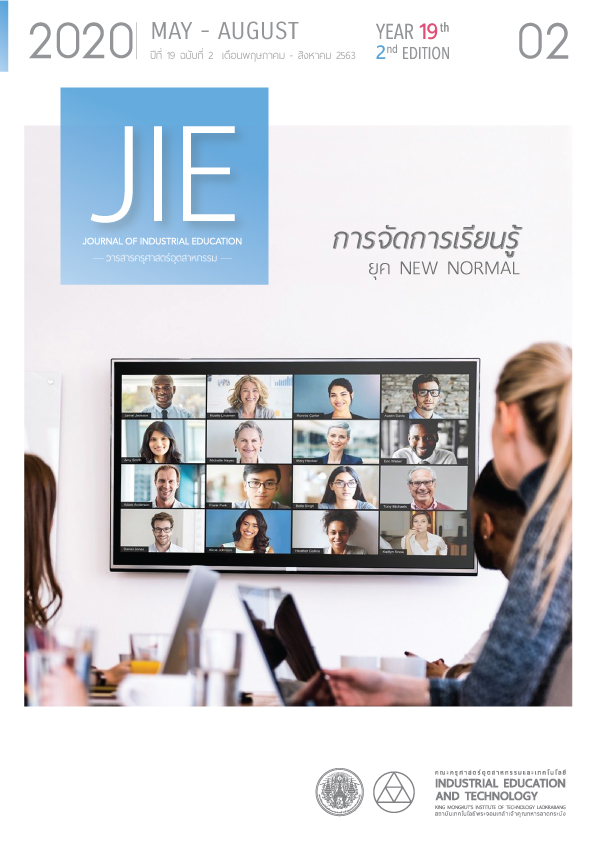THE EFFECT OF LEARNING MANAGEMENT PLAN WITH E-LEARNING BASED ON STEAM EDUCATION ON 10TH GRADE IN PROJECT DEVELOPMENT OF TECHNOLOGY 1 SUBJECT (COMPUTING SCIENCE)
Keywords:
E-learning courseware, STEAM education, project development, computing scienceAbstract
This research aimed to 1) develop a quality learning management plan based on STEAM education in project development of technology 1 subject (computing science) for 10th-graders 2) develop a quality and effective STEAM-based E-learning courseware 3) compare the project development skills achievements between STEAM-based learning management plan and normal learning management learners. The samples were Chonradsadornumrung school's 10th-graders that were cluster random sampled in 1st-semester of the academic year of 2019 which consisted of 3 classes with 45 students each. The research instruments were learning management plan, learning management plan assessment form, E-learning courseware, E-learning courseware assessment form, work behavior observation form (r = .866), and project evaluation form (r = .854). The statistics used for data analysis were arithmetic mean, standard deviation, Pearson product moment correlation coefficient, and pooled variance t-test with statistical significance at the .05 level. The results of this research revealed that 1) the learning management plan based on STEAM education in project development of technology 1 subject (computing science) for 10th-graders was at an excellent level ( = 4.92, S = 0.08) 2) the overall E-learning courseware content quality was at an excellent level (
= 4.72, S = 0.05) and the media quality was at a good level (
= 4.24, S = 0.71) 3) the efficiency of the E-learning courseware (E1/E2) was 86.45/86.91, which higher than the set criteria of 80/80. 4) the STEAM-based learners' development skills achievements were significantly higher than those normal learners at the .05 level.
References
Paitoon Sinlarat, et al. 2016. Education 4.0 is more than education. 3rd ed. Bangkok : Chulalongkorn university.
Ministry of Education. 2017. Indicators and Core Content in Science (Rev. ed. B.E. 2560 (A.D. 2008)) The Basic Education Core Curriculum B.E. 2551 (A.D. 2008). Bangkok : The Agricultural Cooperative Federation of Thailand.
Woranuch Saengchan. 10th grade Computing Science Professional Teacher, Chonradsadornumrung school. March 19, 2019. Interview.
Montri Chulavatnatol. 2013. “STEM Education Thailand and STEM Ambassadors.” IPST. 42(185) : 14-18.
Yakman, G. 2008. STEAM Education: an overview of creating a model of integrative education. Retrieved March 3, 2019, from https://steamedu.com/wp-content/uploads/2014/12/2008-PATT-Publication-STEAM.pdf
Wasinee Itsarasena Na Ayutthaya. 2017. All about STEM Education. 2nd ed. Bangkok : Chulalongkorn university.
Kemmanat mingsiritham. 2016. Creative Educational Media Design. Bangkok : Chulalongkorn university.
Burachai Sirimahasakorn. 2002. Student-centered learning plan. Bangkok : Book Point.
Sukon Sintapanon. 2015. Learning management of modern teachers to improve the skills of learners in the 21st century. Bangkok : 9119 Technic Printing.
KOFAC. n.d. Learning Standards Framework of STEAM Classes. Retrieved May 14, 2019, from https://steam.kofac.re.kr/?page_id=11269
NASA. 2018. Engineering Design Process. Retrieved May 25, 2019, from https://www.nasa.gov/audience/foreducators/best/edp.html
Suwit Moolkum. 2008. Writing learning management plans that focus on thinking. 3rd ed. Bangkok : E.K. Books.
Seels, B., and Glasgow, Z. 1998. Making Instructional Design Decisions. 2nd ed. New Jersey : Merrill.
Priroj Teeranatanakul, Paiboon Kiattikomol and Saksun Yampinij. 2003. Design and producing computer instruction package for e-Learning. Samut Sakhon : Pimdee.
Lofland, J. 1971. Analyzing Social Setting. California : Wadsworth.
Narisara Goedpum, Pariyaporn Tungkunanan and Paitoon Pimdee. 2019. “THE PSYCHOMOTOR ACHIEVEMENT OF FLIPPED CLASSROOM WITH E-LEARNING ON MACHANIC ELECTRIC AND ELECTRONIC.” JIE. 18(3) : 224-231.
Patcharin Chaibubpha, Krissana Kiddee and Sirirat Petsangsri. 2015. “A Development of an E-Learning Courseware on Using Logo Command Language for Grade 8 Students at Aranprathet School.” JIE. 14(3) : 252-258.
Natthaporn Singmanee, Sirirat Petsangsri and Malai Tawisook. 2015. “The Effects of E-learning Courseware using Game-Based Instruction on Information Technology III Subject for 9th Grade Students.” JIE. 14(3) : 592-598.
Supattra Tapiantong, Thiyaporn Kantathanawat and Suwanna Innoi. 2020. “The Learning Management With Google Application for Education Collaboration Networking Lessons to Promote Learning Achievement in Related Skills on The Information Technology in Presentation Method for Grade 9.” JIE. 19(1) : 15-24.
Kim, H.B and Chae D.H. 2016. “The Development and Application of a STEAM Program Based on Traditional Korean Culture”. Eurasia. 12(7) : 1925-1936.
Suranee Sriboon and Wisud Pongen. 2019. “The Learning Outcomes of STEAM Education based on Problem Based Learning to Developing Mathematical Skills and Process for Seventh Grade Students.” JES. 47(1) : 526-543.
Chadtharawadee Boonthanom and Oraphan Butkatunyoo. 2015. “Integrated STEAM Education to Learning Experience Provision by Using Literature Based for Development of Creative Thinking of Preschool Children..” KER. 30(3) : 186-195.
Downloads
Published
How to Cite
Issue
Section
License
"The opinions and contents including the words in papers are responsibility by the authors."
"ข้อคิดเห็น เนื้อหา รวมทั้งการใช้ภาษาในบทความถือเป็นความรับผิดชอบของผู้เขียน"



